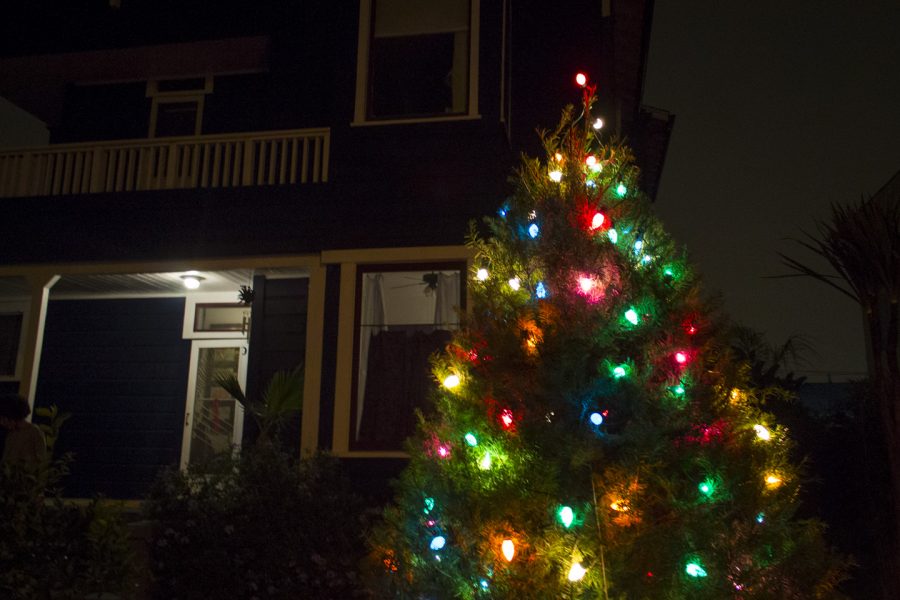Nativity a reminder of God’s love
Chase Andre challenges the Biola community to reexamine the gospel and gospel-proclamations this season.
December 13, 2012
Our Christmas tree is on our front lawn this year. The neighbors who walk by our already strange-looking, big blue house in East LA stop to pause at the display of our in-house decoration outside. There was a time in my life when I revolted against most displays of Christmas trees. I remember shopping with my family for an evergreen in the middle of a Target parking lot once toward the end of high school. And while I was present with them, I was sure to mutter my disapproval — somehow convinced that owning a Christmas tree was the moral equivalent of throwing lit matches in a forest.
Christmas had lost its purpose. It had been stolen by Hallmark, Sony and Walmart. It became a holiday I had to struggle to support. Its tinsel and bells no longer brought the cheer that the Black Friday ads promised.
Then one Sunday morning, my church’s worship band offered a rendition of “Oh, Holy Night.” The congregation sang: “Truly he taught us to love one another / His law is love and his gospel is peace. / Chains shall he break, for the slave is our brother, / And in his name all oppression shall cease.”
And I lost it. This wasn’t a tears-welling, choked-up kind of lost it. I was sobbing, unable to stand, in awe of the simple truth of the gospel hidden in the lyrics of that Christmas song we sing every year.
Nativity Reflections
This morning, as I sip my coffee, eat a donut from the 24-hour donut shop across the block, and listen to the hum of city traffic, I read Luke 2:10, which contain the words of that first heavenly herald announcing the birth of Christ: “Fear not, for behold, I bring you good news of great joy that will be for all the people.”
I can’t help but wonder if the life I’m living heralds the same good news. In my community life at Hollenbeck House, am I offering good news to my neighbors? What about the gang that lives one block up from me? Does the message of my gospel-proclamation reach their ears with great joy? Or is it laced with expectations of conformation before Jesus is birthed into the conversation? I wonder if, in their eyes, I am a good addition to the neighborhood or just another white person gentrifying their corner of Los Angeles. Does my presence make them run toward Jesus? And if it doesn’t, who’s to blame?
Since that Sunday, I’ve learned to love the Christmas season because the nativity narrative so clearly tells of God’s heart. From Thanksgiving until the New Year, everywhere I go, I’m reminded that when God desired to incarnate himself into this world, he asked a young unwedded woman — with no prestige or social right of her own — to stomach the task.
When it was time to announce the birth of a king, the angels bypassed Caesar and steered clear of the Temple in Jerusalem. Instead, those heavenly messengers found the poor working-class shepherds alone in the fields. Jesus’s life is consistent with this paradigmatic contradiction. He was called a friend of sinners and the proclamation of his kingdom angered the religious folks — this hardly seems the predictable path for God to take.
Reexamining our gospel
In the path of our lives, in the way we proclaim our gospel, who are we going to first? This is telling of our motivations. Who feels threatened by our message, and why? If discipleship and sanctification are each truly a refining process, then surely it isn’t unreasonable to assume our method of evangelism deserves regular reexamination. Is our gospel really one of peace? Too often, I fear we choose sides in culture wars, throwing rhetorical grenades and lobbing our votes like stones against our perceived enemies on either side of the line.
I love Christmas because I truly believe that only in the name of Jesus, only because of the Easter resurrection, will all oppression cease. But the nativity marks the reminder that God incarnated himself into our broken world to teach us how to love each other. Our expressions of the gospel are the midterm examinations of those lessons of love. So when we read the nativity story this season—as we inevitably will— let’s look for where, and to whom, the good news was broadcasted and ask what that means for our lives now.
Tomorrow morning, as my feet tiredly stumble toward the sidewalk in the pursuit of another donut, I will look at the Christmas tree on the front lawn as a challenge. It stands as a reminder that we in Hollenbeck House celebrate Christmas, and we’re not ashamed of that — I no longer have the luxury of hiding this from my neighbors. Before I open my mouth, my gospel message is already being formed in their mind. Does that tree point toward Black Friday or Good Friday? Christmas affords us the opportunity to speak peace to the lonely and forgotten in a chaotic, war-torn world. May we reexamine our gospel-proclamations — and the hearts behind them — to further align our world with the heart of the nativity.








